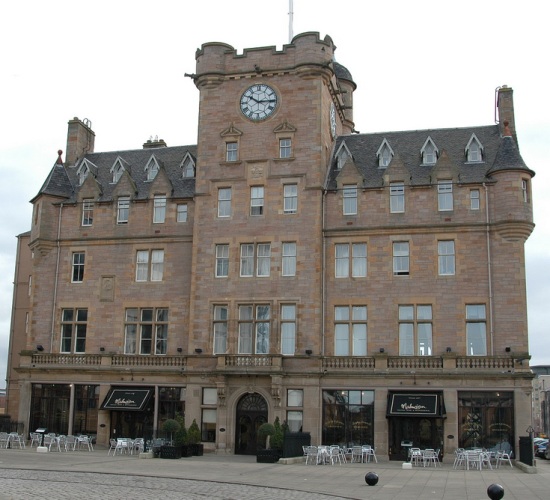Hotel operator Malmaison has been purchased by an American venture capital firm for a rumoured £180 million which is expected to go a long way in paying off debts accrued by parent company MWB Group Holdings. KSL Capital Partners, from Colorado, is now expected to invest further in the Malmaison and included Hotel du Vin chains, with commercial properties in Dundee and St Andrews high on the list of priorities for improvement.

Malmaison Hotel, Edinburgh
Although Malmaison and Hotel du Vin, which together make up the Malmaison Group, were relatively unaffected when MWB Group Holdings entered administration in November, the group did manage to rack up a substantial £187 million debt previously. This meant that the profits of this sale have essentially been negated. However, as the amount owed to lenders has decreased significantly, Malmaison can now begin to invest in its 27 UK properties and even examine the possibility of expanding further afield.
This should be made easier thanks to the Group’s acquisition by KSL, as the firm has extensive experience in the hotel and leisure industry. It previously purchased the Belfrey in Warwickshire for £65 million, making the Malmaison deal only its second major UK deal.
Partner at KSL, Richard Weissmann, seemed keen to play his cards close to his chest, saying only that both brands have “an exceedingly loyal following” and that they have “tremendous potential for further growth and expansion.”
However Malmaison Group chief executive, Gary Davis, was a little more forthcoming. He, like all members of management, will remain in his role and hinted that KSL already had a firm expansion plan in mind by the time the deal was signed.
He said; “Our intention is to be market leader in boutique and town house hotels.
“We will look at where the brands could be successful outside of the UK – we will look at opportunities in mainland Europe.”
Yet he was keen to highlight that existing and potential properties in the UK would not be neglected by the new parent company, revealing plans for expansion and improvement in the coming months. In fact, a £3 million conversion plan will turn the St Andrews Golf Hotel into a Hotel du Vin, with construction expected to begin later in the year.
Mr Davis continued; “We will close the hotel in St Andrews on 1 November to undertake a refurbishment and expansion – it is a great property but it needs a lot of work on it.”
This is just the latest financial development in Britain’s leisure industry, indicating that international investors are finally beginning to return to Europe. As momentum increases, there are hopes that cash injections of this type to a lagging sector will allow the economy to return to strength once more.
Do you think international investments are the best way to stabilise the leisure industry and commercial properties in the hotel industry, or is this simply a quick fix solution to a long term problem?
Previous Post
Supermarket Giant Creates 400 Apprenticeship Places